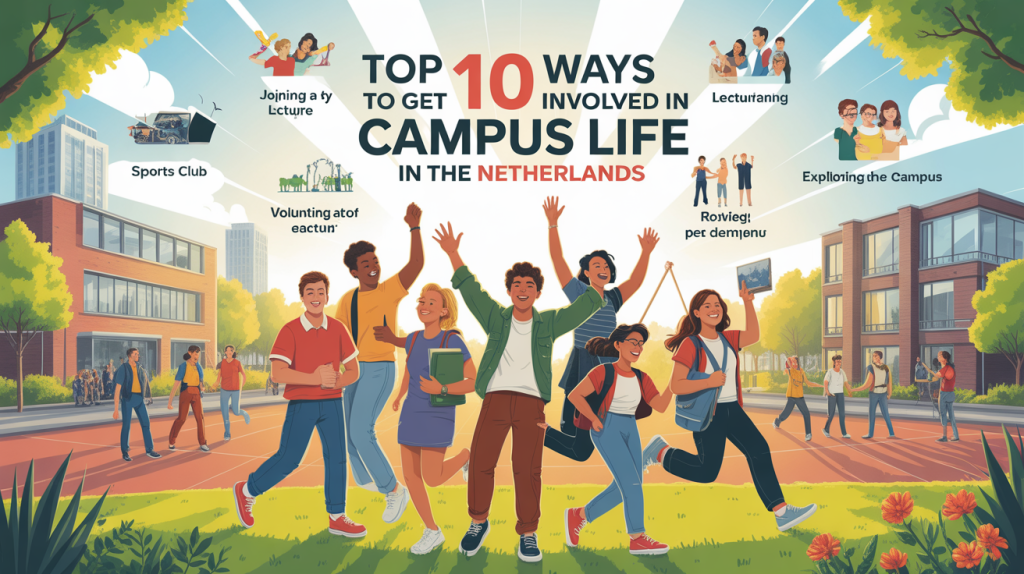Top 10 Ways to Get Involved in Campus Life in the Netherlands
Quick Navigation
- Join a Student Association
- Participate in Sports Clubs
- Attend Cultural Activities and Clubs
- Take Part in Introduction Week
- Join Study Groups or Academic Associations
- Explore Special Interest and Hobby Societies
- Volunteer for Student-Led Events
- Engage in International Student Networks
- Take Advantage of Campus Facilities
- Join a Religious or Philosophical Society
1. Join a Student Association
Student associations are the cornerstone of campus life in the Netherlands. Most universities boast a broad spectrum of associations tailored to socializing, academic disciplines, sports, religious beliefs, and a variety of interests.
Types of Associations:
- Gezelligheidsverenigingen (social associations) foster friendship and networking opportunities.
- Studieverenigingen (study associations) offer academic support, workshops, and networking events within specific faculties.
- Sportverenigingen (sports clubs) offer recreational and competitive sports activities.
Joining a student association is often the quickest way for international students to integrate into the university community and find peers with shared interests.
Learn more about how student associations support international students on our Student Life in the Netherlands page.
2. Participate in Sports Clubs
Physical activity and sports play a vital role in student well-being and social engagement. Dutch universities provide a wide array of sports facilities and clubs suited for various skill levels—from beginners to seasoned athletes.
- Popular options include football, rowing, volleyball, tennis, yoga, and martial arts.
- Many clubs organize regular training sessions, tournaments, and social events.
For recruiters and university admission teams, promoting sports participation can enhance student satisfaction and campus engagement metrics.
3. Attend Cultural Activities and Clubs
Cultural clubs allow students to immerse themselves in Dutch arts and global cultures. Universities offer clubs dedicated to music, theatre, dance, visual arts, and photography.
- Participation enables students to express creativity and embrace cultural diversity.
- Events such as open mic nights, theatre productions, and art exhibitions provide platforms for involvement and skill-building.
Cultural engagement nurtures intercultural competence—an invaluable attribute for international students preparing for global careers.
4. Take Part in Introduction Week (Introductieweek)
The academic year in Dutch universities often begins with an Introduction Week, called Introductieweek. This event is designed to welcome new students with a series of social activities, campus tours, and club fairs.
- It offers an ideal avenue for students to meet peers, explore associations and clubs, and familiarize themselves with campus facilities.
- Participation often results in lasting friendships and quick integration into student life.
University recruiters can emphasize the importance of Introductieweek in pre-arrival communications to encourage early involvement.
5. Join Study Groups or Academic Associations
Academic associations and study groups focus on enhancing students’ scholastic success and professional preparedness.
- These groups organize lectures, workshops, and networking events related to specific disciplines.
- They provide peer support, mentorship opportunities, and connections to industry professionals.
Encouraging students to engage with academic associations boosts retention and academic outcomes, making this a crucial area of focus for educational institutions.
6. Explore Special Interest and Hobby Societies
Beyond academics and major sports, Dutch campuses host societies dedicated to niche interests, including:
- Debating clubs
- LGBTQ+ support groups
- Vegan and sustainability societies
- Nationality and cultural clubs
These societies promote inclusivity and offer platforms for students to connect around shared passions, enhancing overall student satisfaction and mental well-being.
7. Volunteer for Student-Led Events
Volunteerism is an effective way to gain leadership skills and give back to the campus community.
- Students can participate in organizing festivals, charity fundraisers, academic conferences, and social events.
- Volunteering fosters teamwork, project management, and interpersonal skills essential for future employment.
Recruiters and admissions teams can highlight volunteer opportunities as key aspects of the student experience when attracting international applicants.
8. Engage in International Student Networks
For international students, building a support network is critical. Many Dutch universities maintain international student associations dedicated to specific countries or broader global communities.
- These groups help newcomers adapt to Dutch culture and academic life.
- They create social events, cultural exchange programs, and provide information on living in the Netherlands.
Such networks not only enrich students’ social lives but also create lifelong professional connections.
9. Take Advantage of Campus Facilities
Modern campus facilities serve as hubs for student interaction beyond classrooms.
- Libraries, sports centers, student lounges, and recreational rooms host informal meetups, workshops, and interest groups.
- Students benefit from access to well-equipped study spaces and technology-enhanced learning environments.
Promoting these facilities during recruitment can enhance the appeal of studying in the Netherlands.
10. Join a Religious or Philosophical Society
For students interested in faith or philosophical discourse, Dutch campuses provide dedicated spaces and groups.
- Religious associations meet regularly for worship and cultural events.
- Philosophical societies encourage open dialogue and critical thinking on diverse topics.
These groups support holistic development and provide a sense of community for students with specific spiritual or intellectual interests.
Conclusion
Getting involved in campus life in the Netherlands is key to a fulfilling academic journey. From diverse student associations to sports, cultural activities, volunteering, and international networks, Dutch universities offer numerous avenues for engagement. For international students, participation in these activities enhances cultural adaptation, builds soft skills, and creates a resilient support system.
Take the Next Step with Study in Netherlands
Explore further opportunities to enrich your academic and social experience. Partner with Study in Netherlands to connect with a world of resources and support.

